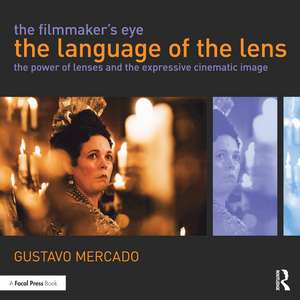The Filmmaker's Eye: The Language of the Lens: The Power of Lenses and the Expressive Cinematic Image
Autor Gustavo Mercadoen Limba Engleză Paperback – 17 iul 2019
Loaded with vivid examples from commercial, independent, and world cinema, The Language of the Lens presents dozens of insightful case studies examining their conceptual, narrative, and technical approaches to reveal how master filmmakers have harnessed the power of lenses to express the entire range of emotions, themes, tone, atmosphere, subtexts, moods, and abstract concepts.
The Language of the Lens provides filmmakers, at any level or experience, with a wealth of knowledge to unleash the full expressive power of any lens at their disposal, whether they are shooting with state-of-the-art cinema lenses or a smartphone, and everything in between.
Preț: 232.96 lei
Nou
Puncte Express: 349
Preț estimativ în valută:
44.60€ • 45.75$ • 37.55£
44.60€ • 45.75$ • 37.55£
Carte tipărită la comandă
Livrare economică 26 februarie-12 martie
Preluare comenzi: 021 569.72.76
Specificații
ISBN-13: 9780415821315
ISBN-10: 0415821312
Pagini: 208
Ilustrații: 175 colour illustrations
Dimensiuni: 229 x 229 x 15 mm
Greutate: 0.66 kg
Ediția:1
Editura: Taylor & Francis
Colecția Routledge
Locul publicării:Oxford, United Kingdom
ISBN-10: 0415821312
Pagini: 208
Ilustrații: 175 colour illustrations
Dimensiuni: 229 x 229 x 15 mm
Greutate: 0.66 kg
Ediția:1
Editura: Taylor & Francis
Colecția Routledge
Locul publicării:Oxford, United Kingdom
Public țintă
Further/Vocational Education and Professional Practice & DevelopmentCuprins
Lenses & Image Systems
Technical Concepts
Space
Movement
Focus
Flares
Distortion
Intangibles
Filmography
Technical Concepts
Space
Movement
Focus
Flares
Distortion
Intangibles
Filmography
Notă biografică
Gustavo Mercado is an award-winning independent filmmaker with well over a decade of experience as a writer, director, and cinematographer of narrative films. His first book in the Filmmaker’s Eye series, "The Filmmaker’s Eye: Learning and Breaking the Rules of Cinematic Composition", has been translated into French, Spanish, Chinese, Polish, Turkish, Portuguese, Japanese, and Korean, and is used by film programs at colleges and universities worldwide. He teaches cinematography, editing, screenwriting, and film production at Hunter College’s Film & Media Studies Department in New York City.
Recenzii
“For the new moviemaking generation, Language of the Lens can serve as a reference point of how some of cinema’s greatest auteurs make use of the lens, as well as a key for how to use the tool. After reading Language of the Lens, moviemakers will be equipped with the ultimate knowledge to command any lens, from an iPhone to the most expensive glass money can buy.”
- Sophie Jonsson, MovieMaker Magazine
”The Language of the Lens is a truly illuminating book, inspiring for emerging filmmakers as well as veteran directors and cinematographers. Mr. Mercado elevates our understanding of the expressive power of artistic lensing and the incredible force of creative filmmaking.”
- John Inwood, Emmy nominated cinematographer of Scrubs and The Unbreakable Kimmy Schmidt
"The Language of the Lens combines beautiful visual examples from a wide range of films to explain the aesthetic and emotional connotations of lens language. Understanding the technical and creative aspects of the lens is essential for cinematographers and directors to punctuate the thematic essence of the scene. A very useful visual reference, this book is a must read for any aspiring filmmaker."
- Jacqueline B. Frost, Author of Cinematography for Directors and Professor, California State University, Fullerton
Descriere
The Language of the Lens explores the expressive power of the camera lens and the storytelling contributions that this critical tool can make to a film project. This book offers a unique approach to learning how lenses can produce aesthetically and narratively compelling images in movies, through a close examination lens techniques.
